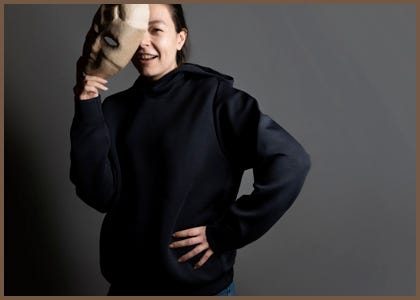Something peculiar happens in the Believer as he grows comfortable within the walls of his church, and it happens very early in those who are born into and raised within the church world. The longer and more consistently we are immersed in the language and culture of the religious universe, the more we learn to wrap ourselves in cocoons of spirituality. Human as we are and continue to be, that human frailty grows increasingly obscured by masks of religiously acceptable presentation.
In his blog of March 2018, musician, author and teacher John Fischer depicts a typical meeting of the Alcoholics Anonymous…
People come as they are. Some smoke outside during breaks. There may be some raw language used in the telling of stories. No one minds. There is no pastor or even AA leader in charge. No one talks down to anyone; they all talk across. The lead passes from one to another each week, but these are people who have been coming for years and have their own stories to tell.
When a man stands up in AA and says, “Hi, I’m Scott and I’m an alcoholic,” and everyone responds, “Hi Scott,” they do so acknowledging that every person kin the room is an alcoholic struggling with his own destructive issues. There’s no room for self-righteousness because each person is marked by similar wounds and scars. No longer black or white, rich or poor, they are—for that hour anyway—fellow strugglers, equals in their shared brokenness.
I’ve found that the rookie Christians among us tend to be more overtly human at church. You can tell who the new ones are. They don’t yet understand the common lingo or the shared spiritual behavior. They tend to speak plain English. On the other hand, many of the religiously sophisticated have evolved into what I think of as secretly human. Now, I’m not a psychologist or a sociologist, but I do know that even the most spiritually visible Christians—including our leaders—privately wrestle with the reality of their own frail humanity.
A few years ago, I decided to stop taking a medication that had been prescribed to me for twenty years. That medication is Methadone, a powerful narcotic pain killer. In my thirties and into my forties I suffered with chronic daily severe headaches—often migraines. A laundry list of assorted medical specialists, chiropractors and witch doctors had tried all sorts of potions, procedures and concoctions, with no real success. Finally, my doctor threw up his hands and prescribed the brand new ‘miracle drug’, OxyContin. Not only did this powerful opioid work, but I really enjoyed taking it. Its effects were so satisfying that I was soon taking more than what was prescribed. Of course, my doctor was duly alarmed by this, so he switched my prescription to Methadone. I don’t remember the logic there, but I was fine with it as I was trading one strong medication for another. Fast-forward twenty years and I was still taking Methadone, even though the headaches had all but disappeared years earlier. And I was still taking more than I was supposed to.
A big problem was—and there were many big problems because of this—I was a pastor throughout most of that time. No one but my wife and daughter knew that I was deeply and seriously addicted to an industrial strength narcotic. I taught regularly, I led Bible studies and I was at my desk every day—all while addicted to Methadone. I felt no obligation to inform anyone. I didn’t tell my boss/pastor. I didn’t tell friends or extended family. No one. The ugly truth is that I just didn’t want to quit. I thoroughly enjoyed the euphoric sensation the pills provided. My doctor kept them coming and I was warmly soothed by this powerful drug.
This troubled me in practically every way. My addiction negatively affected my relationships with my wife and daughter in ways we are still sorting out. It bothered me theologically, meaning that, as a long-time Christian, the guilt I felt was crushing. Why would I entrust to a drug what should have been reserved for my relationship with Jesus, not to mention that of my wife and daughter?
Twenty years into my addiction—on September 8, 2019 to be exact—I decided to quit on my own, without medical assistance, because I finally grew weary of being enslaved to a little white pill.
I share my experience to say that I know what it means to hide my own human brokenness behind a mask of religious respectability. I was the walking definition of secretly human. And I know I’m not alone. Somehow, our American brand of Christianity has encouraged the more experienced Christians among us to wear carefully constructed outer skins of piety. Many of us—too many of us—have gone underground with the truth of our human brokenness.
I once read musician Michael Card’s account of his pastor who, when it came time one Sunday morning to celebrate the Lord’s Supper, stood in front of his congregation and said to them (and I’m paraphrasing), “As we approach the Lord’s Table, and as I look out on you this morning, this much I know to be true: Some of you are cheating on your spouses. Some of you are dishonest in your business dealings. Some of you are addicted to pornography. Some of you are secretly alcoholics and abusive to your families. Some of you aren’t speaking to people you had loved for years. You won’t forgive, you won’t extend mercy, and you won’t get past your own pride.”
The pastor paused, no doubt for effect, and then said to his stunned people, “It is for you that this table is prepared. It is for us, because we are all of us sinners in need of a Savior — this Savior.”
Of course, not all of us are secretly addicted to prescription pain killers. We don’t beat our wives or drink ourselves into oblivion every night. We are—most of us—honest business people, loving husbands and wives and parents and generally try to do the right thing. But we should be clear: we all bear the wounds and scars of our broken humanity. We struggle with—and sometimes even entertain—our own resentment and bitterness and hatred and self-righteousness. We do indeed know ourselves, don’t we?
In his New Testament letter, James tells us to…confess your sins to each other and pray for each other so that you may be healed. The prayer of a righteous person is powerful and effective.
James knew what our Catholic friends also know, a truth we Protestants have largely dismissed: that the act of true confession—one flawed human to another—is essential for us to maintain our humility, our human-ness, in the face of some unspoken religious pressure to appear to be better than we really are. It’s ironic that in spite of our best efforts to present ourselves as spiritually upright, we’re not really fooling anyone. We may not know—and certainly shouldn’t seek to know—the gory details of that guy’s life or this woman’s business, but neither are we fooled into believing that anyone among us is any holier than the next guy.
It could be that we will begin to transcend our own brokenness only when we look it squarely in the face, then reveal ourselves to other broken Christians—even if, at first, it’s in small ways. Somehow, the Holy Spirit’s power to remake us is intertwined with this earthy, person-to-person vulnerability Jesus himself instigated by dirtying his own hands in the Incarnation.
We don’t need to be religious leaders to set an example, to walk into church and leave our religious masks at the door. I dare you to walk in to church this Sunday and confess to someone, “Hi, I’m So-and-So and I’m a filthy sinner.” Maybe—just maybe—that person you talk to will set aside his mask as well.







Hi. I'm Denise -- a fellow sinner in need of God's grace. I am so glad you are writing in this space. I look forward to more to come.
Scott, just read your Substack story, Secretly Human! In my laymen's opinion I think it's a great piece of writing! Thank you for your courage in sharing this and your heartfelt perspective. It's like you've given us a look behind the scenes and truly, we all are human, none of us is perfect and all in need of a Savior and God's saving Grace.
Actually, since we've come to know you and Esther, you both have given me a perspective on the "humaness" of pastors that opened my eyes. "Growing up" in the Catholic church, where I believe they foster separation of laity and the elevation of clergy, I did view them at a "higher" level.
We are truly, all in this together, we are called to serve one another, walk with each other and do life together, as Jesus showed us.